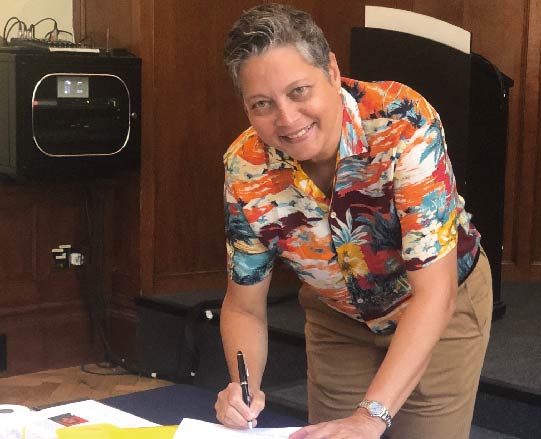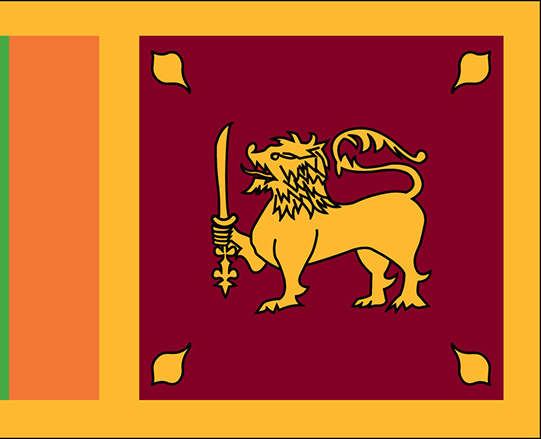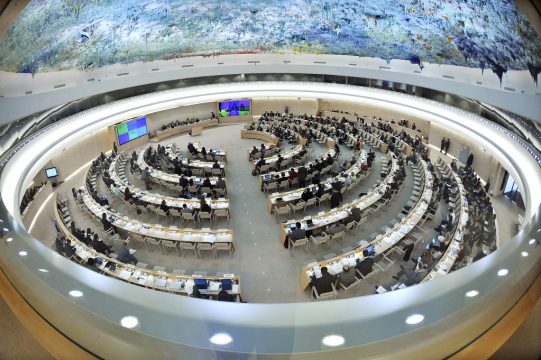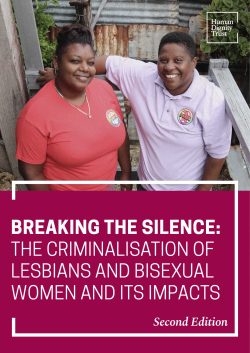On the eve of the three-year anniversary of the 2022 decision by the United Nations Committee on the Elimination of Discrimination against Women (CEDAW), which found that criminalising consensual same-sex intimacy between women in Sri Lanka was a violation of the CEDAW treaty, the Human Dignity Trust urges the Government of Sri Lanka to implement this decision and decriminalise without delay.
The original complaint, brought by Rosanna Flamer-Caldera, Executive Director of Sri Lankan NGO EQUAL GROUND, with the support of the Human Dignity Trust, led to a major legal precedent, holding that the criminalisation of lesbian and bisexual women violates the widely ratified UN treaty.
This week, the CEDAW Committee will be reviewing the Sri Lankan Government’s report to the Committee in relation to its compliance with the CEDAW treaty for the first time since the landmark 2022 decision, and LGBT groups in Sri Lanka, and internationally, will be looking for an explanation on the inaction in implementing this decision.
The CEDAW Committee made it very clear that Sri Lanka is violating its international legal obligations by maintaining laws criminalising same-sex intimacy between females. Three years have now passed since the decision was handed down, yet it has not been implemented by the government in any form. Some forty countries worldwide continue to criminalise consensual same-sex intimacy between women, and they are also clearly in breach of this international treaty.
On 21 February 2022, the CEDAW Committee said that the Sri Lankan authorities had subjected Ms Flamer-Caldera to gender-based discrimination and violence and had not taken any legal or other measures to respect and protect her right to a life free from gender-based violence, or to eliminate the prejudices to which she has been exposed as a woman, lesbian and activist. It also found that the authorities had breached her right to access to justice, since the criminal law constrains her ability to complain of abuses. The Committee urged Sri Lanka to decriminalise consensual same-sex sexual conduct.
The case was unique in drawing attention to the multiple and intersecting forms of discrimination that lesbian and bisexual women face in the country, both because of their sexuality and their gender, therefore setting a powerful precedent.
I said at the time of this decision that our laws criminalising same-sex love would be repealed, and that the Government could no longer sweep them under the carpet, yet here we are, three years later and there is no change. This week, I call on the Committee to once again hold the Sri Lankan Government to account and press them for action to implement the 2022 decision, which brought such relief at the time to both myself and gay and bisexual women across the globe.
The UN CEDAW Committee meets this week to question the Sri Lanka Government on the status of its implementation of legal obligations under the Convention, after which it will produce a final report with recommendations.
Notes to editors
- Read the 2022 decision from the Committee on the Elimination of Discrimination against Women (CEDAW).
- Rosanna Flamer-Caldera was represented by the Human Dignity Trust, Professor Christine Chinkin, Karon Monaghan QC, Dr Keina Yoshida and DLA Piper. The case was built on evidence from the Trust’s original report Breaking The Silence, which highlighted the global extent and impact of criminalisation on lesbian and bisexual women. The Trust has since issued an updated version of this report.
- CEDAW is the body of independent experts that monitors implementation of the Convention on the Elimination of All Forms of Discrimination against Women. The Committee consists of 23 experts on women’s rights from around the world. Countries that are party to the Convention are obliged to submit regular reports to the Committee on how the rights in the Convention are being implemented. The Committee has the power to consider complaints from individuals alleging violations of the Convention by countries that have signed its Optional Protocol. The Flamer-Caldera decision was made under this Optional Protocol procedure.
- The Human Dignity Trust works with LGBT activists around the world to defend human rights in countries where private, consensual, same-sex sexual activity is criminalised. We provide free technical legal assistance to local organisations that are challenging laws that persecute people on the basis of their sexual orientation and/or gender identity.
For more information and to arrange interviews contact:
James Aldworth, Communications Manager, Human Dignity Trust
T: +44 (0)7394 805140
Social media:
Twitter/ X: @HumanDignityT
LinkedIn: @human-dignity-trust
Instagram: @humandignitytrust
Bluesky: @humandignitytrust.bsky.social
YouTube: @humandignitytrust5963




